英语语法总结:反意疑问句
中考英语语法考点知识复习_反义疑问句
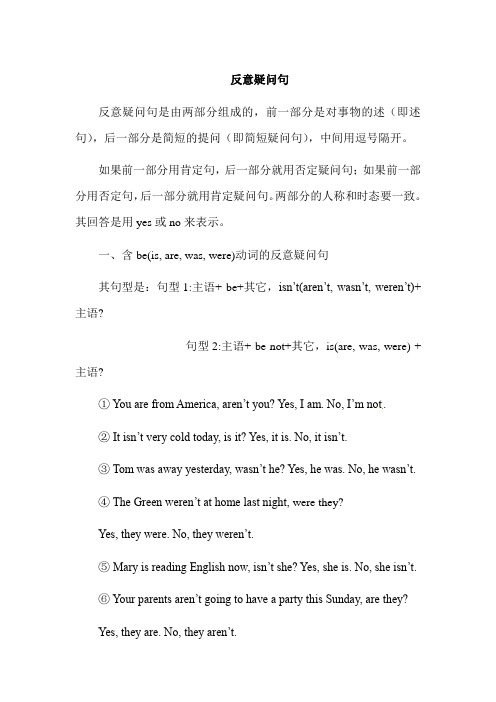
反意疑问句反意疑问句是由两部分组成的,前一部分是对事物的述(即述句),后一部分是简短的提问(即简短疑问句),中间用逗号隔开。
如果前一部分用肯定句,后一部分就用否定疑问句;如果前一部分用否定句,后一部分就用肯定疑问句。
两部分的人称和时态要一致。
其回答是用yes或no来表示。
一、含be(is, are, was, were)动词的反意疑问句其句型是:句型1:主语+ be+其它,isn’t(aren’t, wasn’t, weren’t)+ 主语?句型2:主语+ be not+其它,is(are, was, were) + 主语?① You are from America, aren’t you? Yes, I am. No, I’m not.② It isn’t very cold today, is it? Yes, it is. No, it isn’t.③ Tom was away yesterday, wasn’t he? Yes, he was. No, he wasn’t.④ The Green weren’t at home last night, were they?Yes, they were. No, they weren’t.⑤ Mary is reading English now, isn’t she? Yes, she is. No, she isn’t.⑥ Your parents aren’t going to have a party this Sunday, are they?Yes, they are. No, they aren’t.⑦ The girls were singing when the teacher came in, weren’t they?Yes, they were. No, they weren’t.注意:There be句型① There is an old picture on the wall, isn’t there?Yes, there is. No, there isn’t.② There aren’t any children in the room, are there?Yes, there are. No, there aren’t.③ There wasn’t a telephone call for me, was there?Yes, there was. No, there wasn’t.④ There were enough people to pick apples, weren’t there?Yes, there were. No there weren’t.二、行为动词的一般现在时的反意疑问句其句型是:句型1: 主语+动词原形+其它,don’t I(you, we, they)?句型2: 主语+ don’t+动词原形+其它,do I(you, we, they)?句型3: 主语+动词第三人称单数+其它,doesn’t he(she, it)?句型4: 主语+ doesn’t+动词原形+其它,doeshe(she, it)?① You often watch TV in the evening, don’t you? Yes, I do. No, I don’t.② The students don’t study hard, do they? Yes, they do. No, they don’t.③ Mary studies Chinese hard, doesn’t she? Yes, she does. No, she doesn’t.④ The boy doesn’t often go to school by bike, does he?Yes, he does. No, he doe sn’t.⑤The first class begins at eight, doesn’t it? Yes, it does. No, it doesn’t.三、行为动词的一般过去时的反意疑问句其句型是:句型1: 主语+动词过去式+其它,didn’t+主语?句型2: 主语+didn’t+动词原形+其它,did +主语?① You watched TV last night, didn’t you? Yes, I did. No, I didn’t.② Ji m’s parents didn’t go to Hong Kong last month, did they?Yes, they did. No, they didn’t.③ The rain stopped, didn’t it? Yes, it did. No, it didn’t.④Mr. Clarke didn’t buy a car, didn’t he? Yes, he did. No, he didn’t.四、一般将来时的反意疑问句其句型是:句型1: 主语+will+动词原形+其它,won’t+主语?句型2: 主语+ won’t +动词原形+其它,will +主语?①The boys will play games, won’t they? Yes, they will. No, they won’t.② It won’t stop raining, will it? Yes, it will. No, it won’t.③ Mr. Smith will visit our school next week, won’t he? Yes, he will. No, he won’t.注意:There be句型的一般将来时① There will be a basketball match tomorrow, won’t there?Yes, there will. No, there won’t.② There won’t be too much pollution in the future, will there?Yes, there will. No, there won’t.五、现在完成时的反意疑问句其句型是:句型1: 主语+have+动词过去分词+其它,haven’t+主语?句型2: 主语+ haven’t +动词过去分词+其它,have +主语?句型3: 主语+has+动词过去分词+其它,hasn’t+主语?句型4: 主语+ hasn’t +动词过去分词+其它,has +主语?① You have been to Shanghai before, h aven’t you? Yes I have. No, I haven’t.② You haven’t been to Shanghai before, have you? Yes I have. No, I haven’t.③Jack has done his homework, hasn’t he? Yes, he has. No, he hasn’t.④Jack hasn’t done his homework, has he? Yes, he has. No, he hasn’t.六、现在完成进行时的反意疑问句其句型是:句型1: 主语+have been+动词现在分词+其它,haven’t+主语?句型2: 主语+ haven’t been +动词现在分词+其它,have +主语?句型3: 主语+has been +动词现在分词+其它,hasn’t+主语?句型4: 主语+ hasn’t been +动词现在分词+其它,has +主语?① You have been skating for five hours, h aven’t you? Yes, I have. No, I haven’t.② You haven’t been skating for five hours, have you? Yes, I have. No, I haven’t.③ Bob has been collecting kites since 1999, hasn’t he? Yes, he has. No, he hasn’t.④ Bob hasn’t been collecting kites since 1999, has h e? Yes, he has. No, he hasn’t.七、含有情态动词的反意疑问句其句型是:句型1: 主语+情态动词+动词原形+其它,情态动词否定形式+主语?句型2: 主语+情态动词否定形式+动词原形+其它,情态动词+主语?① You can speak French, can’t you? Yes, I can. No, I can’t.②They can’t understand me, can they? Yes, they can. No, they can’t.③ Ann could swim when she was six, couldn’t she? Yes, she could. No, she couldn’t.④ The students must study hard, mustn’t they? Yes, they must. No, they needn’t.注意:You must go home now, needn’t you? Yes, I must. No, I needn’t.★值得注意的是有时英语的谓语动词并不用否定式(即没加上not),而是用上了“never, little, few, hardly, nothing, nobody”等词,这时该述句也属于否定句,因此,反意疑问句的后半部分应用肯定疑问式。
高三英语语法总复习_反义疑问句

高三语法总复习:反意疑问句反意疑问句又叫附加疑问句。
它表示提问人寻求同意或没有把握,需要对方证实。
它由两部分组成:前一部分是一个陈述句,后一部分是一个简短的疑问句(be/ can…/ do, does, did, have, has, had+人称代词主格?),两部分的人称时态应保持一致。
注意:反义疑问句的否定形式一定要用缩略形式.Ⅰ.反意问句考点分析1、祈使句的反意问句;2、I think +宾语从句的反意问句;3、主从复合句的反意问句;4、表示判断的情态动词构成的反意疑问句。
Ⅱ.反意疑问句的形式1.肯定陈述句 , 否定疑问句?They work here, don’t they?She was ill yesterday, wasn’t she?2.否定陈述句,肯定疑问句?He can’t ride a bike, can he ?You seldom argue with me, do you ?Ⅲ。
简单句中的反意疑问句.一.陈述句部分含有否定词(not, no, never, no one /nobody, nothing, hardly/ scarcely, seldom, few, little)时, 反意疑问句部分用肯定结构。
1.You did nothing wrong,________ ?2.The Swede made no answer, ______________?3.Some plants never blow (开花), _________ ?4.There are few apples in the basket, ____________?5.He can hardly swim, ___________?6.They seldom come late, _________?7.She rarely speaks to you in English, ___________?8.It is impossible for him to make such a mistake,_________ ?二.陈述句部分是含有带有否定前缀或后缀的词时, 反意疑问句部分仍用否定结构。
高考英语重点语法复习反义疑问句

高考英语重点语法复习反义疑问句Standardization of sany group #QS8QHH-HHGX8Q8-GNHHJ8-HHMHGN#反义疑问句反义疑问句(The Disjunctive Question)又叫附加疑问句(Tag Question)。
在口语中,反义疑问句用于发起谈话、询问信息或是礼貌的请求别人去做某件事。
反义疑问句由两部分组成:前一部分是一个陈述句,后一部分是一个简短的疑问句,两部分的人称时态应保持一致。
总体规则一、反义疑问句的语调1、在说话人知道问题的答案,使用反义疑问句表示请求赞同时,后面的反义疑问句部分用降调。
That film was fantastic, wasn't it ↘2、在说话人不明确问题的答案,使用反义疑问句表示说话人需要核实信息时,后面的反义疑问句部分用升调。
You don't know where the boss is, do you ↗二、反意疑问句中的对应规则:1、反意疑问句中问句部分的谓语动词与陈述部分的谓语动词在语气上成相反的对应关系,即:肯定+否定否定+肯定?①You can’t do it, can you?②They are very late for the meeting, aren’t they?2、反意疑问句中问句部分的动词与陈述部分的动词种类要对应一致。
如:①He has supper at home every day, doesn’t he (不能用hasn’t he)②They have known the matter, haven’t they (不能用don’t they)3、反意疑问句中问句部分的动词在时态上应和陈述部分的时态一致。
如:①They will go to town soon, won’t they (不能用don’t they或aren’t they)②He works very hard, doesn’t he (不能用didn’t he或won’t he)注:当陈述部分是I think 加从句时,疑问句应和从句的人称时态保持一致。
英语语法总结反义疑问句
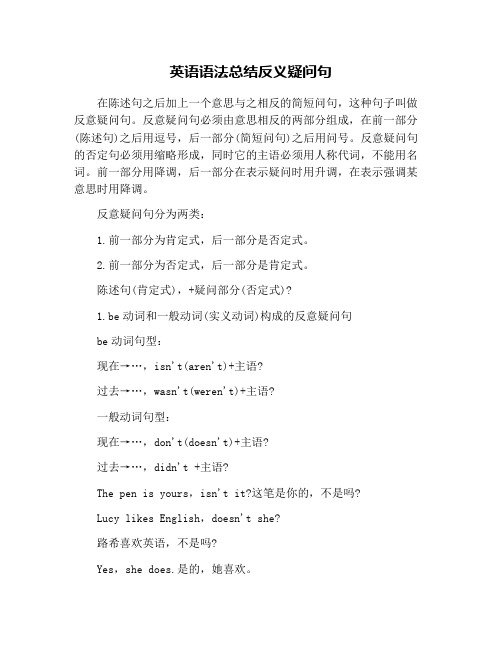
英语语法总结反义疑问句在陈述句之后加上一个意思与之相反的简短问句,这种句子叫做反意疑问句。
反意疑问句必须由意思相反的两部分组成,在前一部分(陈述句)之后用逗号,后一部分(简短问句)之后用问号。
反意疑问句的否定句必须用缩略形成,同时它的主语必须用人称代词,不能用名词。
前一部分用降调,后一部分在表示疑问时用升调,在表示强调某意思时用降调。
反意疑问句分为两类:1.前一部分为肯定式,后一部分是否定式。
2.前一部分为否定式,后一部分是肯定式。
陈述句(肯定式),+疑问部分(否定式)?1.be动词和一般动词(实义动词)构成的反意疑问句be动词句型:现在→…,isn't(aren't)+主语?过去→…,wasn't(weren't)+主语?一般动词句型:现在→…,don't(doesn't)+主语?过去→…,didn't +主语?The pen is yours,isn't it?这笔是你的,不是吗?Lucy likes English,doesn't she?路希喜欢英语,不是吗?Yes,she does.是的,她喜欢。
No,she doesn't.不,她不喜欢。
That was a wonderful night,wasn't it?那是个奇妙的夜晚,不是吗?Yes,it was.是的,它是。
No,it wasn't.不,它不是。
Your sister helped him,didn't she?你姐姐协助了他,不是吗?Yes,she did.是的。
她协助他。
No,she didn't.不。
她没有协助他。
注意反意疑问句中,前后两部分的动词在人称、数和时态上通常保持一致。
另外后一部分的人称代词应和前一部分的主语(名词或代词)保持一致。
Tom is skating,isn't he?(实行时)汤姆在滑冰,不是吗?Yes,he is.是的。
高中英语 语法之反意疑问句
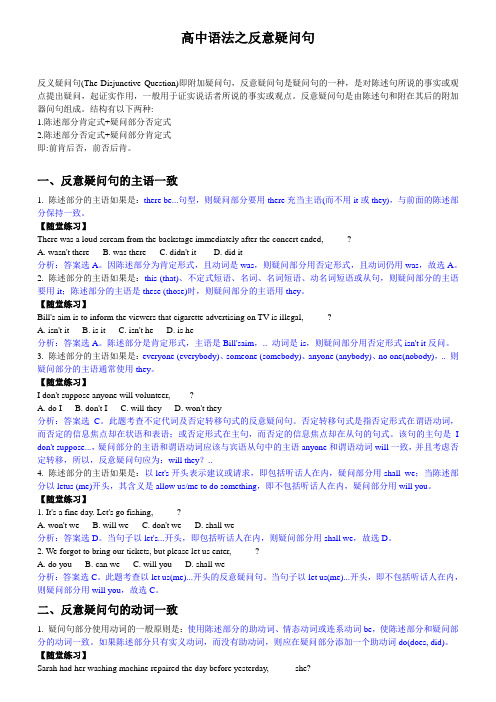
高中语法之反意疑问句反义疑问句(The Disjunctive Question)即附加疑问句,反意疑问句是疑问句的一种,是对陈述句所说的事实或观点提出疑问,起证实作用,一般用于证实说话者所说的事实或观点。
反意疑问句是由陈述句和附在其后的附加器问句组成。
结构有以下两种:1.陈述部分肯定式+疑问部分否定式2.陈述部分否定式+疑问部分肯定式即:前肯后否,前否后肯。
一、反意疑问句的主语一致1. 陈述部分的主语如果是:there be...句型,则疑问部分要用there充当主语(而不用it或they),与前面的陈述部分保持一致。
【随堂练习】There was a loud scream from the backstage immediately after the concert ended, _____?A. wasn't thereB. was thereC. didn't itD. did it分析:答案选A。
因陈述部分为肯定形式,且动词是was,则疑问部分用否定形式,且动词仍用was,故选A。
2. 陈述部分的主语如果是:this (that)、不定式短语、名词、名词短语、动名词短语或从句,则疑问部分的主语要用it;陈述部分的主语是these (those)时,则疑问部分的主语用they。
【随堂练习】Bill's aim is to inform the viewers that cigarette advertising on TV is illegal, _____?A. isn't itB. is itC. isn't heD. is he分析:答案选A。
陈述部分是肯定形式,主语是Bill'saim,.. 动词是is,则疑问部分用否定形式isn't it反问。
3. 陈述部分的主语如果是:everyone (everybody)、someone (somebody)、anyone (anybody)、no one(nobody),.. 则疑问部分的主语通常使用they。
英语语法易错知识点反意疑问句
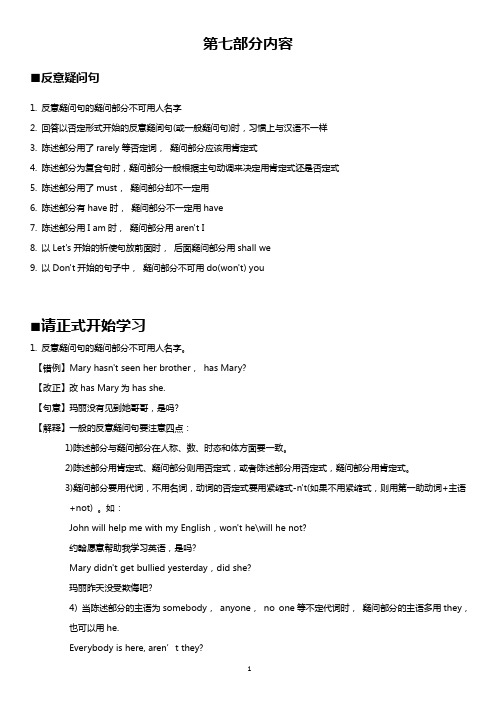
第七部分内容■反意疑问句1. 反意疑问句的疑问部分不可用人名字2. 回答以否定形式开始的反意疑间句(或一般疑问句)时,习惯上与汉语不一样3. 陈述部分用了rarely等否定词,疑问部分应该用肯定式4. 陈述部分为复合句时,疑问部分一般根据主句动调来决定用肯定式还是否定式5. 陈述部分用了must,疑问部分却不一定用6. 陈述部分有have时,疑问部分不一定用have7. 陈述部分用I am时,疑问部分用aren't I8. 以Let's开始的祈使句放前面时,后面疑问部分用shall we9. 以Don't开始的句子中,疑问部分不可用do(won't) you■请正式开始学习1. 反意疑问句的疑问部分不可用人名字。
【错例】Mary hasn't seen her brother,has Mary?【改正】改has Mary为has she.【句意】玛丽没有见到她哥哥,是吗?【解释】一般的反意疑问句要注意四点:1)陈述部分与疑问部分在人称、数、时态和体方面要一致。
2)陈述部分用肯定式、疑问部分则用否定式,或者陈述部分用否定式,疑问部分用肯定式。
3)疑问部分要用代词,不用名词,动词的否定式要用紧缩式-n't(如果不用紧缩式,则用第一助动词+主语+not) 。
如:John will help me with my English,won't he\will he not?约翰愿意帮助我学习英语,是吗?Mary didn't get bullied yesterday,did she?玛丽昨天没受欺侮吧?4) 当陈述部分的主语为somebody,anyone,no one等不定代词时,疑问部分的主语多用they,也可以用he.Everybody is here, aren’t they?No one was hurt,were they?Somebody borrowed my pen yesterday,didn't they?2. 回答以否定形式开始的反意疑问句(或一般疑问句)时,习惯上与汉语不一样。
初中英语语法总结:反义疑问句
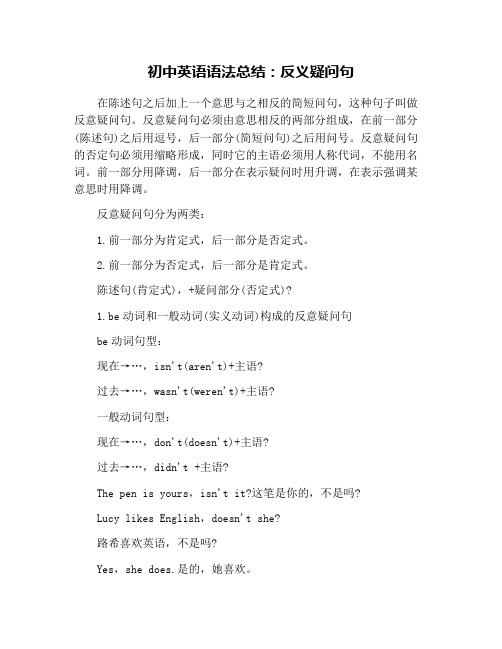
初中英语语法总结:反义疑问句在陈述句之后加上一个意思与之相反的简短问句,这种句子叫做反意疑问句。
反意疑问句必须由意思相反的两部分组成,在前一部分(陈述句)之后用逗号,后一部分(简短问句)之后用问号。
反意疑问句的否定句必须用缩略形成,同时它的主语必须用人称代词,不能用名词。
前一部分用降调,后一部分在表示疑问时用升调,在表示强调某意思时用降调。
反意疑问句分为两类:1.前一部分为肯定式,后一部分是否定式。
2.前一部分为否定式,后一部分是肯定式。
陈述句(肯定式),+疑问部分(否定式)?1.be动词和一般动词(实义动词)构成的反意疑问句be动词句型:现在→…,isn't(aren't)+主语?过去→…,wasn't(weren't)+主语?一般动词句型:现在→…,don't(doesn't)+主语?过去→…,didn't +主语?The pen is yours,isn't it?这笔是你的,不是吗?Lucy likes English,doesn't she?路希喜欢英语,不是吗?Yes,she does.是的,她喜欢。
No,she doesn't.不,她不喜欢。
That was a wonderful night,wasn't it?那是个奇妙的夜晚,不是吗?Yes,it was.是的,它是。
No,it wasn't.不,它不是。
Your sister helped him,didn't she?你姐姐协助了他,不是吗?Yes,she did.是的。
她协助他。
No,she didn't.不。
她没有协助他。
注意反意疑问句中,前后两部分的动词在人称、数和时态上通常保持一致。
另外后一部分的人称代词应和前一部分的主语(名词或代词)保持一致。
Tom is skating,isn't he?(实行时)汤姆在滑冰,不是吗?Yes,he is.是的。
英语语法总结反义疑问句

英语语法总结反义疑问句在陈述句之后加上一个意思与之相反的简短问句,这种句子叫做反意疑问句。
反意疑问句必须由意思相反的两部分组成,在前一部分(陈述句)之后用逗号,后一部分(简短问句)之后用问号。
反意疑问句的否定句必须用缩略形成,同时它的主语必须用人称代词,不能用名词。
前一部分用降调,后一部分在表示疑问时用升调,在表示强调某意思时用降调。
反意疑问句分为两类:1.前一部分为肯定式,后一部分是否定式。
2.前一部分为否定式,后一部分是肯定式。
陈述句(肯定式),+疑问部分(否定式)?1.be动词和一般动词(实义动词)构成的反意疑问句be动词句型:现在→…,isn't(aren't)+主语?过去→…,wasn't(weren't)+主语?一般动词句型:现在→…,don't(doesn't)+主语?过去→…,didn't +主语?The pen is yours,isn't it?这笔是你的,不是吗?Lucy likes English,doesn't she?路希喜欢英语,不是吗?Yes,she does.是的,她喜欢。
No,she doesn't.不,她不喜欢。
That was a wonderful night,wasn't it?那是个奇妙的夜晚,不是吗?Yes,it was.是的,它是。
No,it wasn't.不,它不是。
Your sister helped him,didn't she?你姐姐协助了他,不是吗?Yes,she did.是的。
她协助他。
No,she didn't.不。
她没有协助他。
注意反意疑问句中,前后两部分的动词在人称、数和时态上通常保持一致。
另外后一部分的人称代词应和前一部分的主语(名词或代词)保持一致。
Tom is skating,isn't he?(实行时)汤姆在滑冰,不是吗?Yes,he is.是的。
反义疑问句知识点
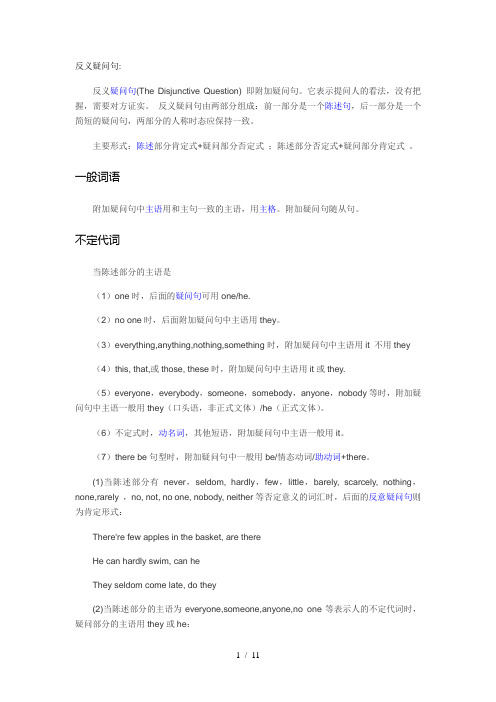
反义疑问句:反义疑问句(The Disjunctive Question) 即附加疑问句。
它表示提问人的看法,没有把握,需要对方证实。
反义疑问句由两部分组成:前一部分是一个陈述句,后一部分是一个简短的疑问句,两部分的人称时态应保持一致。
主要形式:陈述部分肯定式+疑问部分否定式;陈述部分否定式+疑问部分肯定式。
一般词语附加疑问句中主语用和主句一致的主语,用主格。
附加疑问句随从句。
不定代词当陈述部分的主语是(1)one时,后面的疑问句可用one/he.(2)no one时,后面附加疑问句中主语用they。
(3)everything,anything,nothing,something时,附加疑问句中主语用it 不用they(4)this, that,或those, these时,附加疑问句中主语用it或they.(5)everyone,everybody,someone,somebody,anyone,nobody等时,附加疑问句中主语一般用they(口头语,非正式文体)/he(正式文体)。
(6)不定式时,动名词,其他短语,附加疑问句中主语一般用it。
(7)there be句型时,附加疑问句中一般用be/情态动词/助动词+there。
(1)当陈述部分有never,seldom, hardly,few,little,barely, scarcely, nothing,none,rarely ,no, not, no one, nobody, neither等否定意义的词汇时,后面的反意疑问句则为肯定形式:There're few apples in the basket, are thereHe can hardly swim, can heThey seldom come late, do they(2)当陈述部分的主语为everyone,someone,anyone,no one等表示人的不定代词时,疑问部分的主语用they或he:Everyone in your family is a teacher, aren’t they\isn't he?(3)当陈述部分的主语为everything,something,anything.nothing等表示物的不定代词时,疑问部分的主语用it:Something is wrong with your watch, isn’t it(4)当陈述部分含有否定意思的词是unhappy,dislike,unfriendly,等含有否定词缀的派生词,也就是有un,dis,no-前缀、-less后缀等含有词缀而意思否定的词,当做肯定句处理,疑问部分要用否定形式。
英语语法:反意疑问句
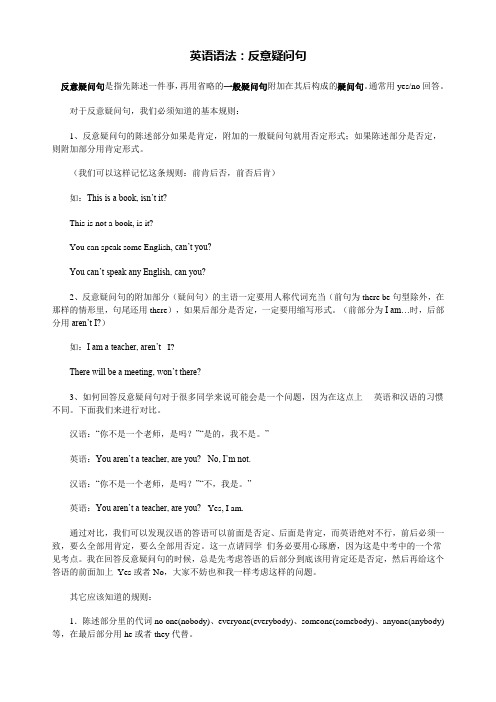
英语语法:反意疑问句反意疑问句是指先陈述一件事,再用省略的一般疑问句附加在其后构成的疑问句。
通常用yes/no回答。
对于反意疑问句,我们必须知道的基本规则:1、反意疑问句的陈述部分如果是肯定,附加的一般疑问句就用否定形式;如果陈述部分是否定,则附加部分用肯定形式。
(我们可以这样记忆这条规则:前肯后否,前否后肯)如:This is a book, isn’t it?This is not a book, is it?You can speak some English, can’t you?You can’t speak any English, can you?2、反意疑问句的附加部分(疑问句)的主语一定要用人称代词充当(前句为there be句型除外,在那样的情形里,句尾还用there),如果后部分是否定,一定要用缩写形式。
(前部分为I am…时,后部分用aren’t I?)如:I am a teacher, aren’t I?There will be a meeting, won’t there?3、如何回答反意疑问句对于很多同学来说可能会是一个问题,因为在这点上英语和汉语的习惯不同。
下面我们来进行对比。
汉语:“你不是一个老师,是吗?”“是的,我不是。
”英语:You aren’t a teacher, are you?No, I’m not.汉语:“你不是一个老师,是吗?”“不,我是。
”英语:You aren’t a teacher, are you?Yes, I am.通过对比,我们可以发现汉语的答语可以前面是否定、后面是肯定,而英语绝对不行,前后必须一致,要么全部用肯定,要么全部用否定。
这一点请同学们务必要用心琢磨,因为这是中考中的一个常见考点。
我在回答反意疑问句的时候,总是先考虑答语的后部分到底该用肯定还是否定,然后再给这个答语的前面加上Yes或者No,大家不妨也和我一样考虑这样的问题。
英语反意疑问句语法总结

英语反意疑问句语法总结1. 反意疑问句的结构特点反意疑问句的基本结构为:陈述句+简略的一般问句。
其中的简略的一般问句通常只用两个词:一个是肯定或否定的be动词、情态动词、助动词,一个是人称代词。
若陈述句是肯定的,简略问句部分用否定式(not要用缩略式);若陈述句部分是否定的,简略问句部分用肯定式。
如:That’s their fault, isn’t it? 这是他们的责任,是吧?You haven’t been abroad before, have you? 你没出过国,对吧?2. 陈述句中含否定词的反意疑问句当陈述句部分含有seldom, hardly, few, little, never, no one, nobody, not hing等表示否定意义的词语时,其后的简略部分要用肯定式。
如:She hardly knows any English, does she? 她几乎不懂英语,对吧?There’s little we can do about it, is there? 对此我们做不了什么,是吧?You seldom work on Sundays, do you? 你很少在星期天工作,是吗?能够注意:但陈述句部分含有像dislike, unknown, impolite之类由否定的前缀或后缀的否定词时,其后简略部分仍用否不定式,不用肯定式。
如:He disliked working late, doesn’t he? 他不喜欢工作到很晚,是吗?3. 陈述句中含have的反意疑问句当动词have作“有”解时,其后简略部分用have或do都可以;若不作“有”解,则必须用do的适当形式;当have是用来构成完成时的助动词时,其后简略部分仍用have;若用于have to,其后简略部分常用加助动词do,不过有时也可用hav e(尤其是表示特定行为时)。
如:You had a lovely holiday last summer, didn’t you? 去年夏天你们的度假玩得很开心,是吗?She has gone out to shop, hasn’t s he? 她出去买东西去了,是吗?He often has to get up early, doesn’t he? 他经常要早起,是吗?4. 陈述句中含情态动词的反意疑句若陈述部分含有情态动词,则情况比较复杂:在通常情况下,当陈述部分含有情态动词时,反意疑问句会重复前面同样的情态动词;若含有must,则反意疑问句可能用mustn’t,或用needn’t(表示“必须”或“有必要”时),可根据must后的动词形式来确定(当must表示推测时)。
反义疑问句
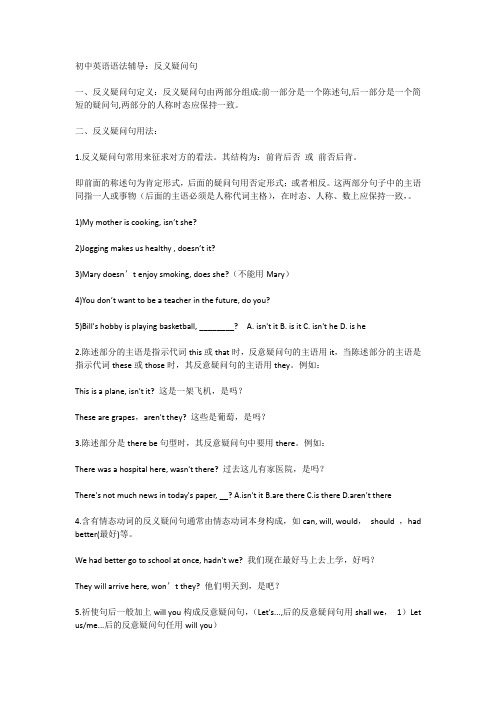
初中英语语法辅导:反义疑问句一、反义疑问句定义:反义疑问句由两部分组成:前一部分是一个陈述句,后一部分是一个简短的疑问句,两部分的人称时态应保持一致。
二、反义疑问句用法:1.反义疑问句常用来征求对方的看法。
其结构为:前肯后否或前否后肯。
即前面的称述句为肯定形式,后面的疑问句用否定形式;或者相反。
这两部分句子中的主语同指一人或事物(后面的主语必须是人称代词主格),在时态、人称、数上应保持一致,。
1)My mother is cooking, isn’t she?2)Jogging makes us healthy , doesn’t it?3)Mary doesn’t enjoy smoking, does she?(不能用Mary)4)You don’t want to be a teacher in the future, do you?5)Bill's hobby is playing basketball, ________? A. isn't it B. is it C. isn't he D. is he2.陈述部分的主语是指示代词this或that时,反意疑问句的主语用it,当陈述部分的主语是指示代词these或those时,其反意疑问句的主语用they。
例如:This is a plane, isn't it? 这是一架飞机,是吗?These are grapes,aren't they? 这些是葡萄,是吗?3.陈述部分是there be句型时,其反意疑问句中要用there。
例如:There was a hospital here, wasn't there? 过去这儿有家医院,是吗?There's not much news in today's paper, __? A.isn't it B.are there C.is there D.aren't there4.含有情态动词的反义疑问句通常由情态动词本身构成,如can, will, would,should ,had better(最好)等。
中小学英语语法(反义疑问句)
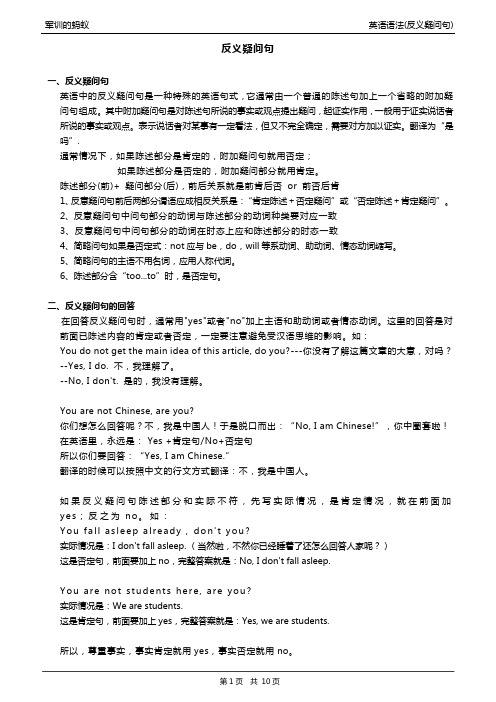
反义疑问句一、反义疑问句英语中的反义疑问句是一种特殊的英语句式,它通常由一个普通的陈述句加上一个省略的附加疑问句组成。
其中附加疑问句是对陈述句所说的事实或观点提出疑问,起证实作用,一般用于证实说话者所说的事实或观点。
表示说话者对某事有一定看法,但又不完全确定,需要对方加以证实。
翻译为“是吗”.通常情况下,如果陈述部分是肯定的,附加疑问句就用否定;如果陈述部分是否定的,附加疑问部分就用肯定。
陈述部分(前)+ 疑问部分(后),前后关系就是前肯后否or 前否后肯1、反意疑问句前后两部分谓语应成相反关系是:“肯定陈述+否定疑问”或“否定陈述+肯定疑问”。
2、反意疑问句中问句部分的动词与陈述部分的动词种类要对应一致3、反意疑问句中问句部分的动词在时态上应和陈述部分的时态一致4、简略问句如果是否定式:not应与be,do,will等系动词、助动词、情态动词缩写。
5、简略问句的主语不用名词,应用人称代词。
6、陈述部分含“too...to”时,是否定句。
二、反义疑问句的回答在回答反义疑问句时,通常用"yes"或者"no"加上主语和助动词或者情态动词。
这里的回答是对前面已陈述内容的肯定或者否定,一定要注意避免受汉语思维的影响。
如:You do not get the main idea of this article, do you?---你没有了解这篇文章的大意,对吗?--Yes, I do. 不,我理解了。
--No, I don't. 是的,我没有理解。
You are not Chinese, are you?你们想怎么回答呢?不,我是中国人!于是脱口而出:“No, I am Chinese!”,你中圈套啦!在英语里,永远是: Yes +肯定句/No+否定句所以你们要回答:“Yes, I am Chinese.”翻译的时候可以按照中文的行文方式翻译:不,我是中国人。
初中英语语法总结反义疑问句
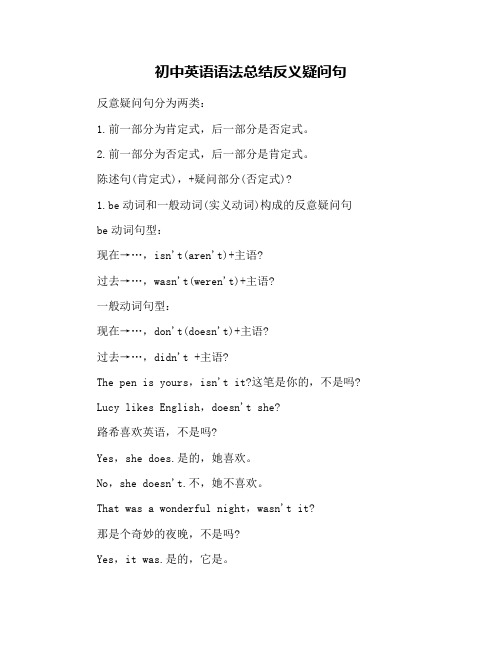
初中英语语法总结反义疑问句反意疑问句分为两类:1.前一部分为肯定式,后一部分是否定式。
2.前一部分为否定式,后一部分是肯定式。
陈述句(肯定式),+疑问部分(否定式)?1.be动词和一般动词(实义动词)构成的反意疑问句be动词句型:现在→…,isn't(aren't)+主语?过去→…,wasn't(weren't)+主语?一般动词句型:现在→…,don't(doesn't)+主语?过去→…,didn't +主语?The pen is yours,isn't it?这笔是你的,不是吗? Lucy likes English,doesn't she?路希喜欢英语,不是吗?Yes,she does.是的,她喜欢。
No,she doesn't.不,她不喜欢。
That was a wonderful night,wasn't it?那是个奇妙的夜晚,不是吗?Yes,it was.是的,它是。
No,it wasn't.不,它不是。
Your sister helped him,didn't she?你姐姐协助了他,不是吗?Yes,she did.是的。
她协助他。
No,she didn't.不。
她没有协助他。
注意反意疑问句中,前后两部分的动词在人称、数和时态上通常保持一致。
另外后一部分的人称代词应和前一部分的主语(名词或代词)保持一致。
Tom is skating,isn't he?(实行时)汤姆在滑冰,不是吗?Yes,he is.是的。
No,he isn't.不。
She is loved by her parents,isn't she?(被动语态)她被她父母亲疼爱着,不是吗?Yes,she is.是的。
No,she isn't.不。
实行时和被动语态的反意疑问句的形式和be动词、一般动词的反意疑问句句型一样。
职场英语语法详解疑问句--反义疑问句

职场英语语法详解疑问句--反义疑问句一、什么是反义疑问句?反义疑问句是由两个部分组成的复合句,在句末加一个简单句的疑问句,用来征求对方的意见或确认某种情况。
通常,反义疑问句由主句和附带疑问句两部分组成,主句部分是肯定句或否定句,对应的附带疑问句部分则相反。
二、反义疑问句的构成方式1. 正反义构成:在肯定句后加否定疑问句,或在否定句后加肯定疑问句。
例如:He is a student, isn't he?他是学生,对吗?He isn't a student, is he?他不是学生,对吗?2. 反非构成:在非肯定句后加非否定疑问句,或在非否定句后加非肯定疑问句。
例如:You won't go, will you?你不会去,对吗?You will go, won't you?你会去,对吗?三、反义疑问句的作用1. 征求对方的意见:反义疑问句常用于征求对方的意见或建议,以增加交流和沟通的效果。
例如:I think we should start now, don't you?我认为我们应该现在开始,你觉得呢?2. 确认某种情况:反义疑问句还可以用来确认某种情况,确保双方对某件事情有共同的认识。
例如:The meeting is at 2 p.m., isn't it?会议是在下午两点,对吗?四、注意事项和常见误区1. 主句和附带疑问句的时态、人称要保持一致。
2. 如果主句是肯定句,附带疑问句为否定形式;如果主句是否定句,附带疑问句为肯定形式。
3. 在口语中,反义疑问句常常使用缩略形式,如:isn't、aren't、won't、wouldn't等。
五、总结反义疑问句在职场英语交流中常用于征求意见、确认情况等,通过研究反义疑问句的构成方式和使用技巧,我们可以提升自己在英语交流中的表达能力和沟通效果。
以上是关于职场英语语法详解疑问句--反义疑问句的内容,希望对您有所帮助。
英语语法 反意疑问句归纳

英语语法:反意疑问句归纳反意疑问句1. 当前面陈述部分的主语是“this, that”时,反意疑问句的主语用it 代替;当前面陈述部分的主语是“these, those”时,反意疑问句的主语用they 代替;当前面陈述部分是感叹句时,反意疑问句的主语应根据感叹句强调的情况选用it 、they 、he 、she 等。
例如:This is a modern hotel built last year, isn’t it ?Those are the apples bought by your classmates, aren’t they ? What lovely flowers, aren’t they ?How stupid a waitress (she is), isn’t she ?2.当前面陈述部分是“There be …”句型时,反意疑问句仍用there …。
例如:As far as I know, there is a little milk in the fridge, isn’t there ? 对比倒装句中的there:There comes the bus, doesn’t it ? 3.当前面陈述部分是“I am + 表语”时,反意疑问句常用“aren ’t I ”。
例如:I am late, aren’t I ? 对比I’m not late, am I ?4.当不定式、动名词短语及从句等充当前面陈述部分的主语时,反意疑问句中的主语用it 。
例如:Learning how to repair cars takes a long time, doesn’t it ? What we need now is to have a big lunch, isn’t it ?To make a long speech makes no difference to me, doesn’t it ? 5.当前面陈述部分是含有宾语从句的主从复合句,反意疑问句的主语通常与主句的主语一致。
反义疑问句(含解析、例句及详尽用法)
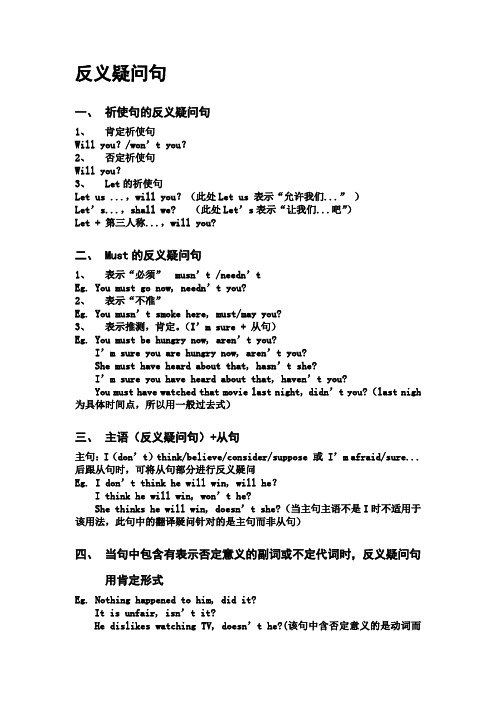
反义疑问句一、祈使句的反义疑问句1、肯定祈使句Will you?/won’t you?2、否定祈使句Will you?3、Let的祈使句Let us ...,will you?(此处Let us 表示“允许我们...”)Let’s...,shall we? (此处Let’s表示“让我们...吧”)Let + 第三人称...,will you?二、Must的反义疑问句1、表示“必须” musn’t /needn’tEg. You must go now, needn’t you?2、表示“不准”Eg. You musn’t smoke here, must/may you?3、表示推测,肯定。
(I’m sure + 从句)Eg. You must be hungry now, aren’t you?I’m sure you are hungry now, aren’t you?She must have heard about that, hasn’t she?I’m sure you have heard about that, haven’t you?You must have watched that movie last night, didn’t you?(last nigh 为具体时间点,所以用一般过去式)三、主语(反义疑问句)+从句主句:I(don’t)think/believe/consider/suppose 或 I’m afraid/sure...后跟从句时,可将从句部分进行反义疑问Eg. I don’t think he will win, will he?I think he will win, won’t he?She thinks he will win, doesn’t she?(当主句主语不是I时不适用于该用法,此句中的翻译疑问针对的是主句而非从句)四、当句中包含有表示否定意义的副词或不定代词时,反义疑问句用肯定形式Eg. Nothing happened to him, did it?It is unfair, isn’t it?He dislikes watching TV, doesn’t he?(该句中含否定意义的是动词而非副词或不定代词,因此不适用于该用法,反义疑问句仍然使用否定形式)五、反义疑问句的回答反义疑问句的回答针对被提问部分的谓语动词,且与回答句前部分的Yes和No 保持一致Eg. A: You haven’t lost the ticket, have you?B: D I know it’s hard to get another one at this moment.A. Yes, I haven’tB. No, I haveC. I hope soD. I’m afraid not六、陈述部分的主语与反义疑问句主语保持一致的情况1、OneEg. One can’t be too careful when driving a car, can one/he?一个人在开车的时候再怎么小心也不为过。
(完整版)英语语法:反义疑问句专项讲解
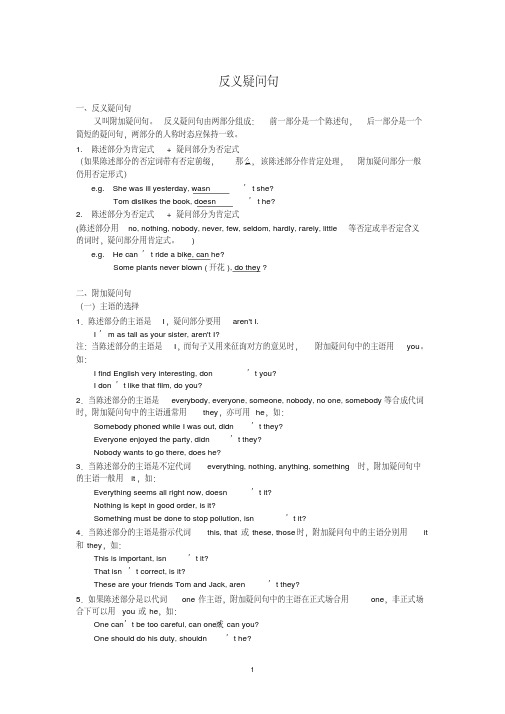
反义疑问句一、反义疑问句又叫附加疑问句。
反义疑问句由两部分组成:前一部分是一个陈述句,后一部分是一个简短的疑问句,两部分的人称时态应保持一致。
1.陈述部分为肯定式+ 疑问部分为否定式(如果陈述部分的否定词带有否定前缀,那么,该陈述部分作肯定处理,附加疑问部分一般仍用否定形式)e.g. She was ill yesterday, wasn’t she?Tom dislikes the book, doesn’t he?2.陈述部分为否定式+ 疑问部分为肯定式(陈述部分用no, nothing, nobody, never, few, seldom, hardly, rarely, little等否定或半否定含义的词时,疑问部分用肯定式。
)e.g. He can’t ride a bike, can he?Some plants never blown (开花), do they ?二、附加疑问句(一)主语的选择1.陈述部分的主语是I,疑问部分要用aren't I.I’m as tall as your sister, aren't I?注:当陈述部分的主语是I,而句子又用来征询对方的意见时,附加疑问句中的主语用you。
如:I find English very interesting, don’t you?I don’t like that film, do you?2.当陈述部分的主语是everybody, everyone, someone, nobody, no one, somebody等合成代词时,附加疑问句中的主语通常用they,亦可用he,如:Somebody phoned while I was out, didn’t they?Everyone enjoyed the party, didn’t they?Nobody wants to go there, does he?3.当陈述部分的主语是不定代词everything, nothing, anything, something时,附加疑问句中的主语一般用it,如:Everything seems all right now, doesn’t it?Nothing is kept in good order, is it?Something must be done to stop pollution, isn’t it?4.当陈述部分的主语是指示代词this, that或these, those时,附加疑问句中的主语分别用it 和they,如:This is important, isn’t it?That isn’t correct, is it?These are your friends Tom and Jack, aren’t they?5.如果陈述部分是以代词one作主语,附加疑问句中的主语在正式场合用one,非正式场合下可以用you或he,如:One can’t be too careful, can one?或can you?One should do his duty, shouldn’t he?6.当陈述句为there be结构时,附加疑问句中的主语也用there。
反义疑问句知识点总结
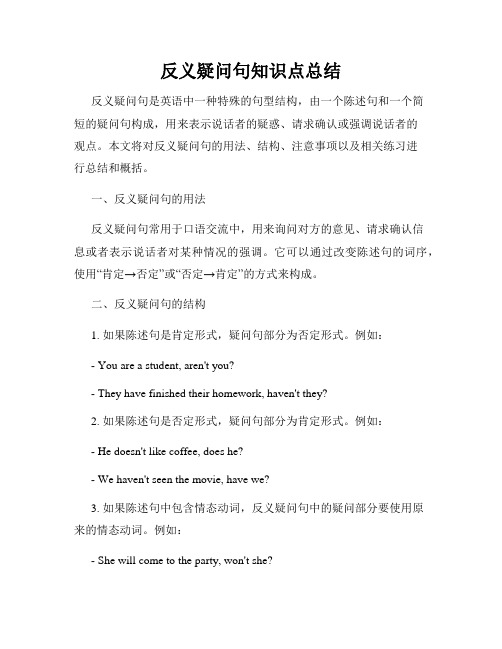
反义疑问句知识点总结反义疑问句是英语中一种特殊的句型结构,由一个陈述句和一个简短的疑问句构成,用来表示说话者的疑惑、请求确认或强调说话者的观点。
本文将对反义疑问句的用法、结构、注意事项以及相关练习进行总结和概括。
一、反义疑问句的用法反义疑问句常用于口语交流中,用来询问对方的意见、请求确认信息或者表示说话者对某种情况的强调。
它可以通过改变陈述句的词序,使用“肯定→否定”或“否定→肯定”的方式来构成。
二、反义疑问句的结构1. 如果陈述句是肯定形式,疑问句部分为否定形式。
例如:- You are a student, aren't you?- They have finished their homework, haven't they?2. 如果陈述句是否定形式,疑问句部分为肯定形式。
例如:- He doesn't like coffee, does he?- We haven't seen the movie, have we?3. 如果陈述句中包含情态动词,反义疑问句中的疑问部分要使用原来的情态动词。
例如:- She will come to the party, won't she?- They can swim, can't they?4. 如果陈述句中使用了“let's”来表示建议,反义疑问句中疑问部分要使用“shall we”。
例如:- Let's go for a walk, shall we?5. 如果陈述句中使用了“there is”或“there are”,反义疑问句中疑问部分要使用“isn't there”或“aren't there”。
例如:- There is a book on the table, isn't there?三、注意事项1. 反义疑问句的结构要与陈述句的主语保持一致。
- She is a doctor, isn't she?(正确)- She is a doctor, aren't you?(错误)2. 主语如果是第三人称单数,疑问句的代词要使用对应的第三人称代词,即“he、she、it”。
- 1、下载文档前请自行甄别文档内容的完整性,平台不提供额外的编辑、内容补充、找答案等附加服务。
- 2、"仅部分预览"的文档,不可在线预览部分如存在完整性等问题,可反馈申请退款(可完整预览的文档不适用该条件!)。
- 3、如文档侵犯您的权益,请联系客服反馈,我们会尽快为您处理(人工客服工作时间:9:00-18:30)。
英语语法总结:反意疑问句
1.一般用法:
He is a student, isn't he?
He isn't a student, is he?
(1) “have to, had better, used to”要用下列方式反问:He has to finish the work, doesn't he?
They used to smoke, didn't / usedn't they?
You'd better get up immediately, hadn't you?
(2) “has, have”作为助动词和实意动词,反问形式不同。
We have done all the work, haven't we?
You have some time, don't you?
2.“seldom, barely, hardly, scarcely, few, little”语意本身是否定,因此反意问句应为肯定形式。
She seldom comes to visit us, does she?
He hardly knew it, did he?
3.当主句为祈使句,反意问句提出要求,命令应用“will you”
Do it at once, will you?
但如表示邀请,劝告,反意问句用“won't you”
Have a cup of tea, won't you?
4.否定祈使句应用“will you”来反问。
Don't open the window, will you?
5.“Let's”短语
●当其为肯定形式,“shall we”提出反问
Let's play basketball, shall we?
●当其为否定形式,“all right, ok”提出反问
Let's not go to the party, all right?
●如为“let us ...”其反问形式应为“will you”提出请求
Let us go home, will you?
6.当“think, suppose, consider, believe”etc 被用作为主句谓语动词,其后带有宾语从句时,反意疑问问句应与从句保持一致。
I don't think that he is an honest man, is he?。
